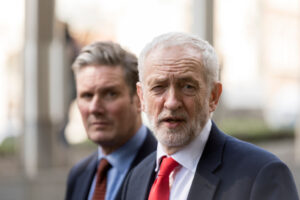Optimism is crucial to success in democratic politics. There is plenty of evidence to back up this platitude. Bill Clinton came from the town of Hope in Arkansas, and never let voters forget it. An advertisement for Ronald Reagan in 1984 opened with “It’s morning in America again”. New Labour marched to the soundtrack of “Things Can Only Better”.
By contrast, only a small number of Grinches with long memories and cynical dispositions point out that Churchill opened his wartime premiership with the promise of nothing but “blood, sweat and tears”. (His government of 1951, by contrast, promised to “set the people free” and ended up being, even in the eyes of his greatest admirers, an embarrassing shambles.) As for Reagan, his success owed at least as much to fear — of the Soviet Union, of national decline, of urban disorder — as it did to hope. Rambo not Rockie is the film to watch if you want to understand American politics in the early Eighties. We Grinches would point out that the most successful politician of recent times, Donald Trump, trades on the feeling that “carnage” is just around the corner.
Of course, the Left has a particular problem. It is, or has been, about selling change. Left-wing candidates have usually sought to persuade their supporters that things can get better, whereas British Conservatives argued that change was likely for the worst.
This brings us to the current state of the Labour Party. A few years ago, it looked as though Starmer would be Neil Kinnock — painfully leading his party back to electability but not quite fast enough to get elected himself. Now everything is going right for him. He is ahead in the opinion polls; his party is disciplined; his opponents — the SNP as much as the Conservatives — are falling apart. Prudent commentators talk of the dramatic swing that would be necessary for Labour to get an absolute majority in parliament, but my own money is on something close to a landslide.
This is not, though, quite the same as saying that Labour should be optimistic. In his conference speech last week, Starmer blamed the Tories for “kicking the hope out”. But this is not a hopeful time. Tony Blair came to power in almost uniquely propitious circumstances. Norman Lamont lost the Tories their reputation for economic competence with the sharp drop in the value of the pound on Black Wednesday of 1992, but Labour inherited the benefits of Ken Clarke’s competent Chancellorship that followed Lamont’s dismissal. Blair also reaped the results of patient negotiation by the Major government in Northern Ireland. This was good news for the province but also for the climate in Westminster: for the first time since the Sixties, senior ministers could walk the streets without a phalanx of nervous-looking bodyguards.
Conditions beyond the reach of the British government’s policy were also good. The fall of the Soviet Union meant that peace and democracy seemed to be on the rise. Almost everywhere except North Korea, spending on armaments dropped in the Nineties. World-weary commentators had spent years saying countries that had lived under Communist rule would take decades to adjust to liberal democracy but, as it turned out, the Czech Republic — one of the more repressive countries in the eastern bloc during the Eighties — was a liberal democracy within a few years. Even China seemed to have moved away from the repression of 1989, which was why the handover of Hong Kong did not, in the short term, produce the exodus that some had expected.
Compare this with what is likely to hit the next Labour government. If Keir Starmer becomes prime minister, he will face the worst circumstances that any new British prime minister has faced since May 1940. The sadistic relish with which Jeremy Hunt references economic figures makes one suspect that, first, he has given up all hope of buying the next election with tax cuts and, second, he does not even want to buy the next election because he knows that the consequences of Brexit and Covid may still be making themselves felt in five years’ time. And that’s not to mention the larger, sometimes existential, problems that the next government is going to face: Putin, Trump, China, climate change.
So, the model for an incoming Starmer government should not be Blair’s victory in 1997 but Thatcher’s in 1979. She was not swept into power by a wave of hope; she floated in on a tide of despair. The Labour Party was exhausted after five years of trying to rule with a tiny minority. One of its most important leaders, Roy Jenkins, had effectively given up on the party. Not that the Tories were bouncing with excitement. At the time, the body thinking most usefully about the future of the Conservative Party was The Authority of Government Group: it met in an atmosphere of Eeyorish gloom. Its members thought that the power of the unions, among other things, might make Britain ungovernable — they were particularly worried by the prospect of future miners’ strikes, which they thought they would be unable to “win”. Some of them privately admired the Callaghan Labour government of 1976 to 1979, and doubted whether they would be able to do any better if they were elected.
Britain today is gripped by the same kind of pessimism that prevailed in the late Seventies — and Starmer needs to recognise this. The Labour Party should act within its constraints rather than acting as their job is to cheer everyone up with a group sing song. Indeed, nothing will undermine the Tories more than their recent, and most un-Tory, displays of optimism. Rishi Sunak’s new slogan seems to be “Long-term decisions for a brighter future”. If I were a Labour strategist, I would plaster the country with photographs of a grinning Boris Johnson having his cake and eating it.
Labour should play down expectations. It is often said that the public have lost faith in politicians. This is the exact opposite of what has happened. They have lost respect for politicians but, in some respects, this is precisely because they have too much faith in them. The public has come to treat politics as 17th-century peasants treated witchcraft — as a source of unlimited, if often malign, power. The fact that the NHS has long waiting lists in the aftermath of Covid is assumed to be the result of incompetence or bad intentions by ministers, rather as crop failure would once have been regarded as the result of some unpopular old woman putting toads in her cauldron.
Thatcher’s great achievement was to persuade people that there are many things that a government cannot do much about. Furthermore, when a government can do something, it invariably means making ruthless decisions about the balance between harm and good; as Nigel Lawson, quoting the French politician Pierre Mendès France, put it in his resignation speech: “To govern is to choose.” For Thatcher, this insight was applied to the economy: subsidies were withdrawn from industries that were bound to fail. The area of brutal choice for Starmer will be the environment.
Currently, the Labour leader is running scared from the result of the Uxbridge by-election, where opposition to Sadiq Khan’s measures against the most polluting cars seemed to account for an unexpected Tory victory. Starmer is also given to spouting nonsense about how everyone will benefit from a “Green industrial revolution”, when the truth is that protecting the future of the planet — or even just protecting the lungs of children who are unfortunate enough to live near the Westway flyover — is not going to come from a cosy, win-win solution. People, particularly vociferous middle-aged men, will be made to stop doing things that they want to do. Similarly, Starmer, who campaigned so energetically against Britain leaving the European Union, can hardly now plausibly claim that there is a “good Brexit” — especially at a time when the public seems to be losing faith that such a thing exists. Starmer should level with voters: his negotiations with Europe will be an exercise in damage control.
The other lesson of 1979 is that parties should not be sentimental about their voters. Many Tories were heartbroken that Scots abandoned them in that election: it is said that “Rab” Butler told Thatcher that she would have Scotland engraved on her heart as Mary Tudor had Calais, lost to the English crown in 1558, engraved on hers. But it was a small price to pay for winning seats in Essex or the Midlands. Labour should write off part of the Red Wall vote. Losing Birmingham Northfield, a working-class seat that used to revolve around the Longbridge car plant, is a small price to pay for holding every other seat in the city. There has been much talk recently of the “woke elite” holding “luxury beliefs” when it comes to, say, immigration — but “woke elite” in this context really means an educated middle class that is larger than ever before, and politically engaged. In truth, there would be no more self-indulgent luxury for the Labour Party than to hold on to a diminishing group of traditional working-class voters out of nostalgia, as if Left-wing politics is a Hovis ad.
Of course, there are some respects in which the first Thatcher government is a bad model for Starmer. Thatcher was lucky because Britain became a net exporter of oil early in her government and because General Galtieri was stupid enough to give her an opportunity for an easy military victory and, thus, a much higher level of electoral support. This meant that, for her first few years, Thatcher just had to survive, whereas she could afford to be radical — even, sometimes, optimistic — after the 1983 election. It is hard to imagine fortune smiling in this way on any British government in the next few years — and easy to imagine scenarios, such as a Russian attack on Poland, that would make a sizeable dent in Starmer’s good luck.
Unlike Thatcher, Starmer cannot afford to wait. He should take brave and controversial decisions early on — prioritising those, such as making some serious progress on the HS2 rail line, that would be hard for any subsequent government to reverse. Because for all his optimism, he cannot bet on a second term. Perhaps, in short, the best hope for the next Labour government would be to start with as little hope as possible.
Disclaimer
Some of the posts we share are controversial and we do not necessarily agree with them in the whole extend. Sometimes we agree with the content or part of it but we do not agree with the narration or language. Nevertheless we find them somehow interesting, valuable and/or informative or we share them, because we strongly believe in freedom of speech, free press and journalism. We strongly encourage you to have a critical approach to all the content, do your own research and analysis to build your own opinion.
We would be glad to have your feedback.
Source: UnHerd Read the original article here: https://unherd.com/



